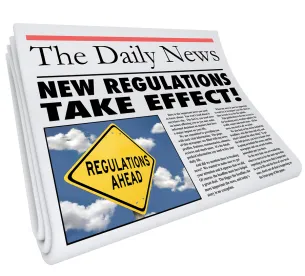Spokane, Washington has become the next city to pass a paid sick leave law. On January 26, 2016, the Spokane City Council overrode the Mayor’s veto of ORD C35300 [pdf] (originally passed by the Council on January 11). The new law will become effective on January 1, 2017. The law states that it applies to all employers “in the City of Spokane who employ employees who physically perform more than two hundred forty (240) hours of work within the City of Spokane.” It is thus not clear whether employers must be physically located in Spokane for the law to apply, or whether the 240 hours is a yearly requirement or a one-time threshold, but hopefully the City will provide some guidance on this issue over the next year. The law does not apply to work‑study students, seasonal workers, temporary workers, independent contractors, domestic workers or employees engaged in certain construction work.
Eligible employees will accrue one hour of paid sick leave for every 30 hours worked. Employees of businesses with up to nine employees may use up to 24 hours of leave per year, while employees of businesses employing 10 or more employees per year may use up to 40 hours of leave per year. Employees may carry over up to 24 hours of accrued, unused sick leave to the next year. Notably, the law does not appear to have an accrual cap. Sick leave may be used for the diagnosis, care, or treatment of the employee’s or the employee’s family member’s mental or physical illness, injury or health condition, for domestic violence‑related purposes, for times when the employer’s business or the employee’s child’s school or place of care is closed by order of a public health official, or for bereavement leave for a family member’s death. As with other sick leave laws, employers may require documentation of the appropriate use of sick leave as set forth in the law. Employers must post notice of employee rights under the law, and must maintain records of each employee’s earned sick time accrual and use for at least three years. In addition, employers must provide employees with information about their accrued earned sick leave balance at least once per quarter. Finally, the ordinance gives a startup business a year after the issuance of their first City of Spokane business license before they must comply with all the law’s requirements.
Pittsburgh’s sick leave law, set to go into effect this year, was struck down on December 21, 2015 by the Allegheny County Court of Common Pleas, which held that Pennsylvania state law prohibits municipalities from regulating businesses by determining their duties, responsibilities or requirements. The decision has been appealed, but Pittsburgh’s sick leave law is not in effect during the pendency of the appeal.
Employers with employees in Puerto Rico need to revise their sick leave policies. Beginning January 1, 2016, employers must allow employees to use up to five days of their accrued paid sick leave to care for the employee’s children, spouse, mother or father, or minors, elderly or disabled persons of which the employee has custody or is the legal guardian. Employees may not use sick days for these purposes if it would bring their total sick leave balance below five days, however. Employers are entitled to require medical certificates for such absences that exceed two days. Notably, these changes do not apply to employers of 15 or fewer employees in Puerto Rico.
On January 14, 2016, New York City’s Department of Consumer Affairs issued updates to the City’s FAQs on its paid sick leave law. The FAQ updates reiterate and clarify certain requirements of the law, including (but not limited to):
-
Clarifying front-loading requirements;
-
Clarifying carryover requirements for part-time employees;
-
Revising guidance on joint-employer relationships;
-
Reiterating that employers must maintain a written sick leave policy; distributing the required Notice of Employee Rights alone is not enough; and
-
Clarifying that the Notice of Employee Rights must be delivered to employees (posting or making available online is not sufficient).
Employers with employees in New York City should review the revised FAQs and their sick leave policy to ensure continued compliance.
On December 17, 2015, Seattle amended its Paid Sick and Safe Leave law (Ordinance 124960 [pdf]) (and other labor laws, more on that below) in several respects. Among other things, the amendments:
-
Provide for a private right of action for employees who have suffered an adverse action because of their good faith use or attempted use of paid sick leave. The private right of action becomes effective in April 2016 for employers of 50 or more employees, and in April 2017 for smaller employers.
-
Increase civil penalties for employers who violate the law, including the notice and posting requirements (as we stated previously, there is no better time than the present to make sure you are in compliance with the notice provisions of the various sick leave laws).
-
Change the minimum-use increment from one-hour to quarter-hour increments, unless it is not “feasible” for the employer to do so because of their payroll system—this is the smallest increment of any of the sick leave laws across the country.
-
Require that records documenting hours worked and sick/safe time used be kept for three years (up from two years)
Employers should also be aware that under Seattle’s law, effective April 1, 2016, they must give employees written notice of the employer’s policy and procedure for meeting the requirements of the law, including but not limited to the employer’s choice of benefit year; tier size; rate of accrual, use and carry-over of paid sick and paid safe time hours; manner of providing employees with an updated amount of available paid sick and safe time hours each time wages are paid; and notification requirements for absences and requesting leave.




 />i
/>i

